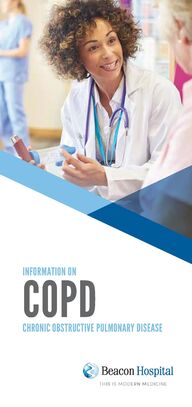
Return to flip book view
INFORMATION ON COPD CHRONIC OBSTRUCTIVE PULMONARY DISEASE THIS IS MODERN MEDICINE
INFORMATION ON COPD CHRONIC OBSTRUCTIVE PULMONARY DISEASE Being told you or someone you love has Chronic Obstructive Pulmonary Disease can be a very overwhelming and frightening experience The medical information you receive may be confusing and difficult to understand at times It is important to remember that you are not alone and there are things you can do to help manage the symptoms and improve your overall quality of life The following gives a brief outline of COPD and will help to answer some questions you may have
What Is COPD Chronic obstructive pulmonary disease COPD is the blanket name for a number of lung conditions including chronic bronchitis and emphysema These diseases make it difficult for patients to breathe What Tests Are Performed To Confirm COPD If you are a smoker have a cough that produces phlegm and suffer from shortness of breath you may have COPD Your doctor may ask you to blow into a machine called a spirometer which measures how well your lungs are working Your doctor may also refer you for an x ray or further tests How Is COPD Treated There is no cure for COPD but a lot can be done to relieve your symptoms Stopping smoking at any stage of the disease will help reduce your cough and phlegm Drugs called bronchodilators open up the narrowed airways and make it easier for you to breathe Depending on the severity of the disease either a short acting or long acting bronchodilator may be prescribed If required a higher dose of these medicines can be given using a nebuliser In this case the doctor will give you a prescription and the respiratory nurse will teach you how to work the easy to use machine In some cases steroid inhalers are used to reduce inflammation and make it easier to breathe
You may be prescribed a combination of these medications for your condition your doctor and nurse will advise you on their use COPD can be made worse by chest infections so if you have a fever or chills and or your phlegm becomes brown or green you should see your doctor If you have an agreed emergency backup plan for medication use activate it now A course of antibiotics or a short course of steroids may be prescribed to treat the infection Ask your doctor or pharmacist for the flu injection every year This will reduce the possibility of chest infections
What You Can Do To Help With Your COPD Try to stop smoking completely and avoid second hand smoke Avoid contact with anyone who has a cold or a chest infection and wash your hands often If you think you have a chest infection see your doctor Get your flu vaccine every autumn Try to do some gentle exercise every day Ask your physiotherapist for advice Dry air can make you cough make the air more moist with a humidifier or by placing a bowl of water on a window ledge To improve your exercise and breathing skills take part in a Pulmonary Rehabilitation You can register for this by contacting our Physiotherapy department on physiotherapy beaconhospital ie Breathing through your mouth can make you dehydrated so try to drink plenty of fluids such as water and fruit juices Try to eat little and often for example five small meals rather than three large ones A full stomach after a large meal will make it more difficult for you to breathe If you have any queries about your COPD diagnosis or medications that you are on speak with your pharmacist or call the Respiratory Liaison Nurse at Beacon on 0879532610 Monday Friday 0800 1500 and we will be happy to help with any queries you may have
Beacon Hospital Sandyford Dublin 18 D18 AK68 Tel 01 293 6600 www beaconhospital ie